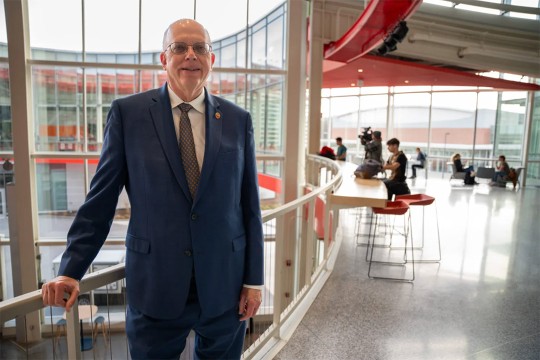Nabil Nasr named to United Nations panel
Sustainability leader to head International Resource Panel’s efforts around remanufacturing
A. Sue Weisler
Nabil Nasr has been named a member of the United Nations Environmental Program’s International Resource Panel, comprising international experts guiding the U.N. on its environmental priorities.
Nabil Nasr, associate provost and director of Rochester Institute of Technology’s Golisano Institute for Sustainability, has been named a member of a United Nations panel dedicated to protecting use of the world’s natural resources.
The United Nations Environmental Program’s (UNEP) International Resource Panel, widely considered the most authoritative scientific forum for scientists and experts working in the area of natural resource management, was launched in 2007 to build and share knowledge toward improving the use of resources worldwide.
The panel consists of eminent scientists, highly skilled in resource management issues. Their reports distill the latest scientific, technical and socio-economic findings around global resource use. The panel’s goal is to steer people away from over-consumption, waste and ecological harm to a more prosperous and sustainable future.
In addition to reports around global resource use, the panel provides advice and connections between policymakers, industry and the community on ways to improve global and local resource management. It is comprised of scientists and governments from both developed and developing regions with the goal of steering the planet away from over-consumption, waste and ecological harm toward a more prosperous and sustainable future.
In his appointment letter to Nasr, Achim Steiner, U.N. under-secretary-general and UNEP executive director, wrote “the next years will certainly be exciting for the International Resource Panel … expectations for the Panel are growing as the work streams mature, and as resource issues gain importance in the political agenda.”
“To be selected to serve on this panel is a tremendous honor and I am very excited to have the opportunity to work with such an outstanding panel to help inform policymakers globally in areas related to sustainable management of natural resources,” Nasr said. “For RIT, this is terrific recognition for the expanding global reputation of our world-class Golisano Institute for Sustainability (GIS).”
During a meeting in the Netherlands last month, the panel identified areas for future research: the “circular economy” (remanufacturing); ecosystem resilience and restoration; the governance of natural resources and poverty eradication, and marine resources.
Nasr is leading the panel’s discussions and proposals surrounding remanufacturing and the circular economy, a generic term for an industrial economy that is designed to becoming more restorative in its relationship with the environment.
About the International Resource Panel
The International Resource Panel was established in 2007 to provide independent, coherent and authoritative scientific assessments on the sustainable use of natural resources and the environmental impacts of resource use over the full lifecycle. By providing up-to-date information and the best science available, the panel contributes to a better understanding of how to decouple human development and economic growth from environmental degradation. Through its scientific assessments, the panel’s findings have been used in discussions and decisions on establishing new policies in the areas of resource efficiency, sustainable consumption and production, and a green economy. Go to the UN Environmental Programme website for information.
About UNEP
The United Nations Environment Program (UNEP) is the voice of the environment in the U.N. system. Established in 1972, UNEP’s mission is to provide leadership and encourage partnership in caring for the environment by inspiring, informing and enabling nations and peoples to improve their quality of life without compromising that of future generations.
UNEP’s work involves providing support for environmental assessment and reporting; legal and institutional strengthening and environmental policy development; sustainable use and management of natural resources; integration of economic development and environmental protection; and promoting public participation in environmental management.















